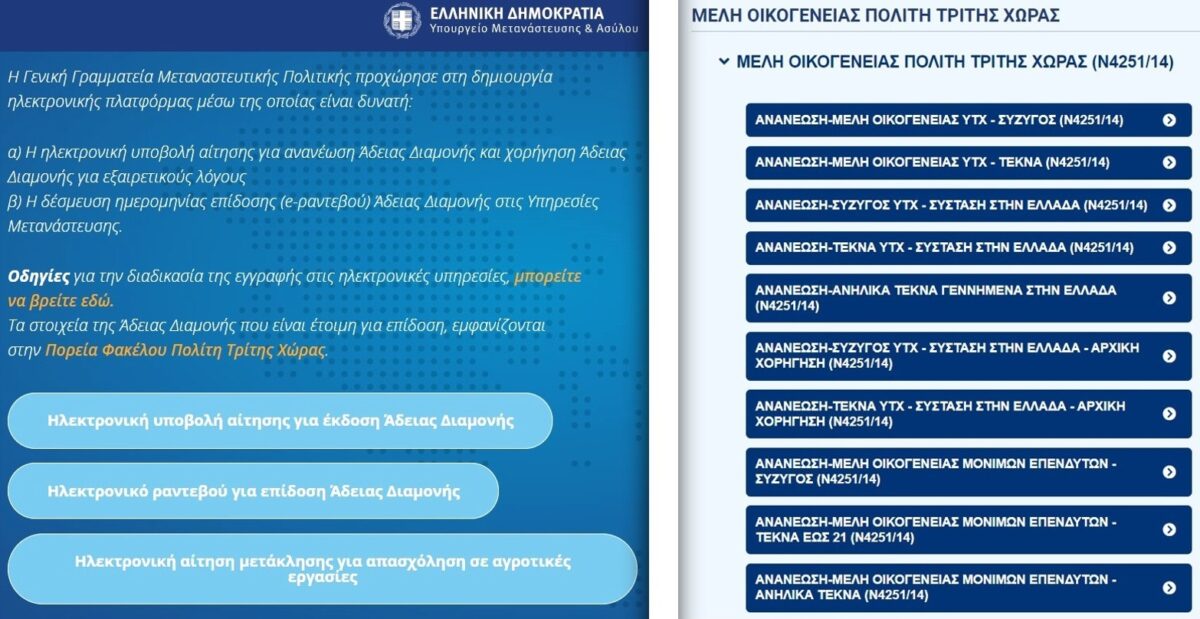An online platform made for Greeks only

Since March 2020, until very recently, the Directorates of Foreigners & Immigration (greek abbreviation: DAM) stopped being open to the public due to Covid-19 lockdown restrictions until recently, there was no provision as per the renewal of the expired residence permits. Thus, one extension of residence permits followed the other. The Ministry had, at that time, announced its intention of setting up an online platform dedicated to the residence permits’ renewal. After 21 months of waiting and hardships for thousands of immigrants, on November 16, 2021 the Ministry of Immigration and Asylum launched this new online platform intended for renewal of residence permits. The applications for renewals are now submitted online through the website of the Ministry while the supporting documents must be uploaded there as files,in order for the designated DAMs to take over and examine the applications.
Our perception towards this unprecedented delay in launching the platform was that it occurred due to taking sufficient time to properly design and operate this new online service. As promised by the designated services of the Ministry, the platform would loosen the hands of the administration and above all, it would be friendly and easy for immigrants to use. Yet today, two weeks after its’ launch, we are unfortunately in a position to draw the exact opposite conclusions, for the reasons listed below:
- The “maze” of 178 subcategories: In order to begin the application, the category of the residence permit to which the person pertains to, must be selected first. The main categories that appear on the main page of the platform, are divided into subcategories which in total amount to 178 options! Their titles are difficult to understand, they often contain legal terminology, while we also see numbers of articles of the Immigration Code (Law 4251/2014) being used, resulting in the impossibility of locating the category to which it belongs, in certainty. Apart from this, there is a lack in some categories, especially in some possibilities for changing purposes, e.g. from second generation to dependent work.
- Online platform in Greek only: While the platform is aimed towards an immigrant population, there is no translation of the platform’s categories into any other language, not even English. Consequently, immigrants who are not familiar with the Greek language, let alone legal terminology, are a priori excluded from using the platform.
- False documents: In most of the categories, the documents requested are usually much less than what the Immigration Services actually request. This differentiation will certainly lead the services to request the missing documents in the future, as additional supporting documents, which will result in prolonged delays as per the process. It is noteworthy that even wrong documents are requested, such as e.g. the health booklet as proof of insurance, while it has been permanently abolished since 2019!
- Certificate without serial number: Upon successful submission of the application, a certificate of submission is issued as proof – instead of the formerly known “blue certificate” – which is delivered by email to the applicants. The ministerial decision that frames the new procedure, stipulates that the certificate of submission should have a serial number (barcode/QR code) in order for its data to be checked by the authorities. However, all the certificates that have been issued so far do not possess a serial number. In other words, these are documents that have no official stamp and therefore their authenticity is not guaranteed. There have already been testimonies from immigrants, who have dealt with issues across public services that do not recognize this new type of document, and have even been fined in cross-border checks, as the Police have considered the holders of this document as illegal residents in the country. Therefore, travelling abroad for third-country nationals will remain an obstacle.
- Endless queue of uncountable pending applications: During the renewal process, there is no prioritization depending on the expiration date of the residence permits. Everyone must submit their application by December 31, 2021 whether their license expired on March 5, 2020 or should expire on December 31, 2021. It should be noted that, while this is only the second week of operation of the platform, the serial number of applications has exceeded the number of 50,000 while thousands of new requests are added every day. In fact, according to official data, the residence permits that are expected to expire by 31/12/2021 amount to 250,000.
Long story short, the Ministry of Immigration and Asylum has created a platform that is greatly dysfunctional, with many errors, with shortcomings and mainly “hostile” to the population to which it is addressed, i.e. immigrants. This new reality will only force people to go through extra expenses and effort, as they will be forced to turn to professionals for assistance and get themselves into new hassles – as usual. Finally, the electronic process not only does not resolve the long-standing issues but intensifies them. The volume of applications for renewals in the designated DAMs of urban centers, which will amount to tens of thousands per service, in combination with their chronic understaffing, will only increase the already endless delays in the residence permits’ renewal process. How many years will it take until all requests are processed? In 2, maybe 3? And what will the status of the permits be, when issued? Uneventfully, expired, like it used to happen in the past?

 Ελληνικά
Ελληνικά

